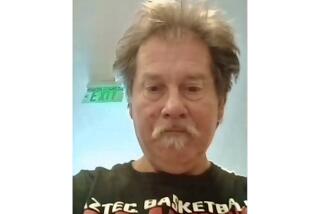Patient Fights Cancer, and Identity Theft
- Share via
SEATTLE — Lying in a hospital bed, dying from cancer and weak from massive doses of chemotherapy, Eric Drew began to get mail. Not from well-wishers but from banks and credit card companies, thanking him for opening accounts he knew nothing about.
After a maddening six months of calling the companies, police, reporters and collection agencies, Drew discovered who had stolen his identity: a technician at the Seattle Cancer Care Alliance, where he received the first of his two bone marrow transplants last fall.
The technician, Richard W. Gibson, 42, was sentenced to 16 months in prison Friday, the first person in the nation sentenced under a new law designed to protect patients’ privacy, federal prosecutors said.
He also will be required to pay at least $15,000 in restitution, including reimbursing Drew for the time and money he spent trying to clear his name.
“This court considers your behavior in this case to be some of the most deplorable I’ve seen in 15 years on the bench,” U.S. District Judge Ricardo Martinez told Gibson.
The sentence was four months longer than prosecutors requested.
Drew, a mortgage banker from Los Gatos, Calif., recently had his second bone-marrow transplant at the Fairview-University Medical Center in Minnesota.
“I felt completely ignored, frustrated and totally violated,” he said in a videotaped statement played in court Friday. “Nobody seemed to empathize or care about this situation whatsoever, and my doctors and family wanted me to drop it because they were worried about the huge amount of stress this was placing on me.”
Drew, 37, discovered he had leukemia in early 2003, said his lawyer, Gregory Ursich. He began treatment at Stanford University Medical Center for what he called a “terminal case” of the disease and was transferred to the Seattle Cancer Care Alliance in September 2003.
Within a few weeks, the mail started. He called the companies and banks about every fraudulent application he learned of, and urged them not to issue credit. Some issued it anyway.
“My frustration level grew as more and more application confirmations and then collection calls started to come in,” Drew said. “Months went by where I was extremely sick and unable to pursue all the calls and letters regarding the fraudulent accounts.”
The identity theft consumed his life and made it impossible for him to to raise money for bone marrow drives, charities and individual patients. He previously had raised $250,000 for such causes, he said.
After his transplant in December 2003, he began visiting the Seattle Police Department, banks, even the post office, tracking down the letter carrier who delivered to the address associated with the fraudulent accounts. Even with the address, he said he received little help from authorities. Finally, a local television reporter jumped on the story and within three weeks obtained video of someone making fraudulent purchases.
Drew was stunned -- Gibson had at least once drawn Drew’s blood.
“I am very sorry about what I did,” Gibson told the judge Friday. The judge said he believed Gibson was remorseful, but didn’t buy his explanation that he needed the money.
“You didn’t pay a mortgage. You didn’t pay heating bills,” Martinez said. “You bought video games. You bought jewelry. You took advantage of that position of trust you were in ... for the most base reason of all: greed.”
More to Read
Sign up for Essential California
The most important California stories and recommendations in your inbox every morning.
You may occasionally receive promotional content from the Los Angeles Times.













